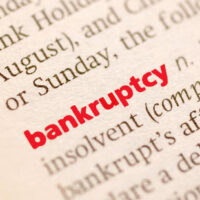Debt Negotiation

If you are facing increasingly mounting debts and feel overwhelmed, you may be considered filing for either Chapter 7 bankruptcy or Chapter 13 bankruptcy. While both of these options will help you with regard to your debt, there are also several types of debt negotiation options available to you as a consumer. Exploring these options before you make a decision to file for bankruptcy can help ensure that you are making the best financial decision for your specific circumstance.
Debt Negotiation
Chapter 7 bankruptcies will eliminate most of your debts in a short amount of time but require you to sell most of your assets. Chapter 13 bankruptcy will allow you to create a repayment plan to repay your creditors over a 3 to 5 year period and allow you to keep most of your assets. Before you decide to file for bankruptcy, however, you should consider the four alternatives to bankruptcy that involve the ability to negotiate your debts with your creditors. If these options work in your situation, you may be able to avoid filing for either Chapter 7 or Chapter 13 bankruptcy.
- Credit Counseling. Credit counseling is an option for those debtors who need an independent and unbiased perspective regarding their finances. A nonprofit credit counselor will examine the wages and debts that a person has and offer a complete financial review of their situation and offer suggestions regarding the best courses of action.
- Debt Management. Debt management companies are typically nonprofit and also provide credit counseling for debtors which include specific financial plans that will help a person pay down their debts. These can be found online or by meeting in person with a debt manager. Some of these plans may take 3 to 5 years to complete but would avoid the need for declaring bankruptcy.
- Debt Consolidation. Some nonprofit companies for a fee will negotiate your debt with creditors to have it reduced. These companies will usually consolidate your debts into one monthly payment. In some cases, these plans will allow a person to reduce the total balance that is actually owed to creditors. However, this plan also negatively impacts your credit score, so it is important to make sure that you understand the consequences of your particular decision.
- Debt Settlement. You may have the option to enter into a debt settlement with each of your creditors to reduce the amount you owe in exchange for paying a full lump sum payment. Again, this option may negatively affect your credit score.
Let Us Help You Today
If you find yourself struggling financially, you have many options including credit counseling, debt management, debt consolidation, debt settlement, and declaring either Chapter 7 or Chapter 13 personal bankruptcy. If you are considering filing for bankruptcy, contact an experienced bankruptcy attorney today to help you understand the process, and help you determine if it is the right course of action for your specific financial situation. Contact the experienced West Palm Beach bankruptcy attorneys today at Kelley Kaplan & Eller at 561-264-6850 for a consultation.
Resource:
uscourts.gov/services-forms/bankruptcy/bankruptcy-basics/chapter-11-bankruptcy-basics
https://www.kelleylawoffice.com/what-to-expect-when-you-hire-a-bankruptcy-attorney/



